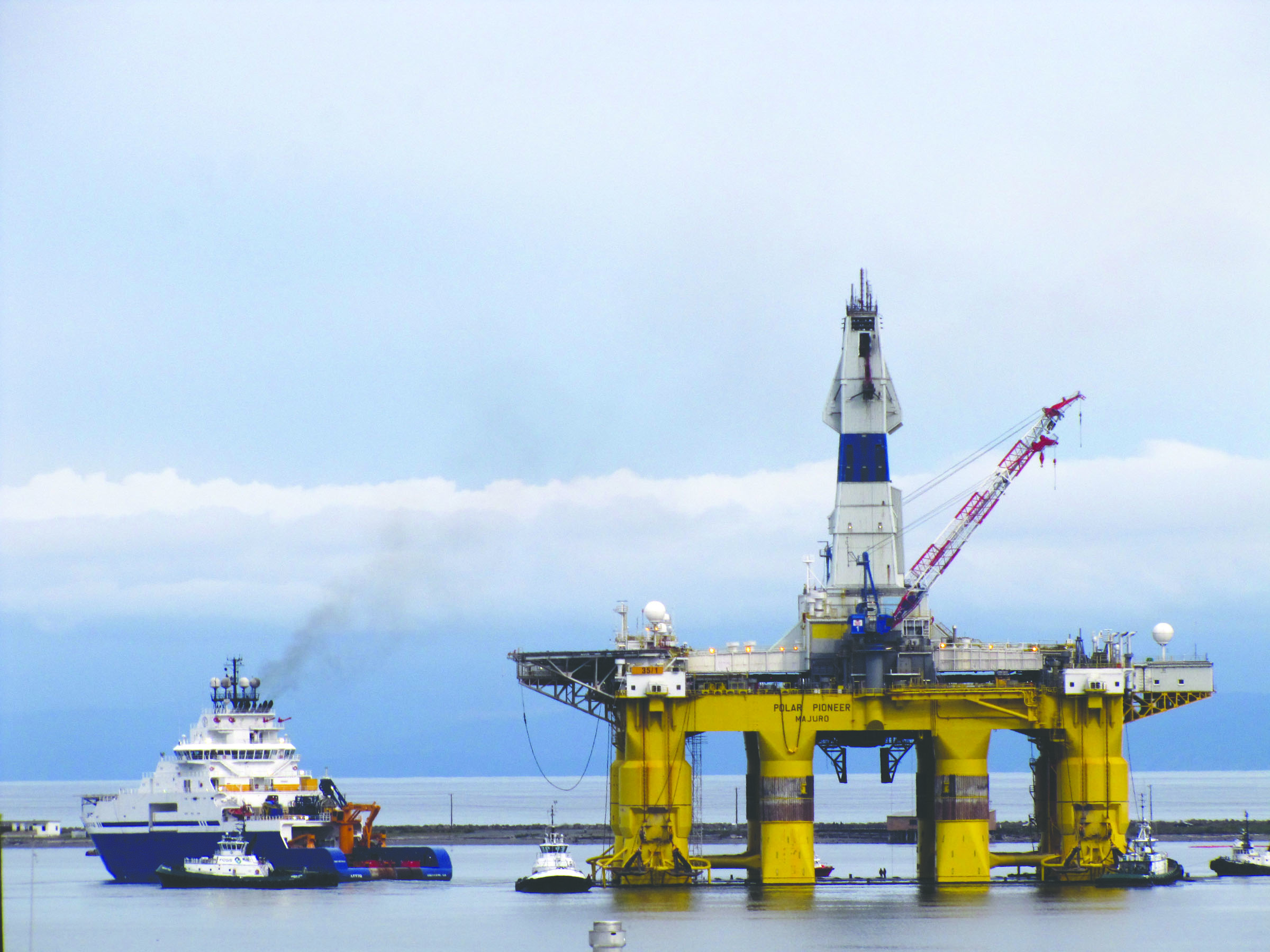PORT ANGELES — The towering Polar Pioneer oil rig began moving out of Port Angeles Harbor at 1:40 a.m. today.
It is accompanied by several tugboats, among them the Andrew Foss, Lindsay Foss and Pacific Star.
The 355-foot-tall oil rig, which has been at anchor in the Port Angeles Harbor since April 17, is being towed to Seattle, where it is expected to arrive in about 12 hours.
A Shell Oil representative said Wednesday that the oil rig would be towed to Seattle sometime today.
Its departure was delayed by a week after Seattle Mayor Ed Murray — citing a recent Seattle Department of Planning and Development code interpretation — said May 4 that the Port of Seattle must apply for a new permit before it can host the rig at Terminal 5.
The Port of Seattle decided earlier this year to grant a two-year, $13 million lease for terminal space to Foss Maritime.
Foss Maritime is a Seattle-based company working with Shell to prepare its fleet for an expedition to the Arctic.
The Polar Pioneer is one of two oil rigs being leased by Royal Dutch Shell, the parent company of Shell Oil Co., and slated to be used this summer for exploratory drilling in the Chukchi Sea off Alaska’s northern shore.
Murray said he is an opponent of renewed oil drilling there.
The U.S. Bureau of Ocean Energy Management on Monday approved the multiyear exploration plan in the Chukchi Sea for Shell after reviewing thousands of comments from the public, Alaska Native organizations and state and federal agencies.
Additional permits are needed before drilling can begin.
Noble Discoverer
The second vessel leased by Shell, the Noble Discoverer, arrived in the Port of Everett on Tuesday.
The drill ship will join the Polar Pioneer at Terminal 5 in the near future, said Megan Baldino, Shell Oil Co. spokeswoman.
City of Seattle officials have said the use of the terminal as a base for drill rigs isn’t allowed under the port’s current land-use permit, which is for cargo operations.
If the two rigs are “there simply to be moored for a period rather than deliver or receive cargo . . . then we would regard this as a moorage use rather than a cargo terminal use,” said Wendy Shark, city of Seattle public relations specialist.
During a public meeting Tuesday, the Port of Seattle commission voted to appeal the city’s interpretation calling for new permitting.
Foss also will appeal that determination and forge ahead with its plans in the meantime.
The commissioners also voted to request that Foss ask Shell to delay any moorage of oil exploration vessels at Terminal 5 pending further legal review.
Foss said it would do no such thing.
Before the vote, company President Paul Stevens said the commissioners knew full well what activities would be occurring at the terminal when they granted the lease.
“We’re going to proceed,” he said.
He noted the Polar Pioneer will arrive at Terminal 5 today.
When the oil rig arrives in Seattle, protesters who don’t want Shell to drill for oil in the Arctic have said they will meet it in kayaks.
Protesters set up a tall tripod-shaped structure at the gate of the Shell facility in Seattle on Tuesday morning.
Activists oppose drilling
During the nearly five-hour Port of Seattle commission meeting, activists made clear their opposition to drilling in the Arctic.
They argued that there are no resources available to respond to a major spill in the Chukchi Sea.
And burning the oil Shell proposes to take from the Arctic would push the planet past the tipping point on climate change and worsen the acidification of oceans, they insisted.
“The oceans are more important than oil,” said Mark Hennon, 66, of Seattle.
“If the plankton goes extinct, a million jobs won’t matter, nor will any amount of money, because we’ll all be dead.”
There were also many proponents at the meeting, which drew a wide range of voices, including several people who traveled from Alaska.
Alaskan proponents
Representatives of Alaska Native corporations argued that the environmentalists opposing the drilling don’t understand the economic needs of Alaska’s Natives, and Alaska state Sen. Cathy Giessel urged the commission to honor the history of economic ties between Washington and Alaska that date to the Alaska Gold Rush and continue today with Washington refineries handling Alaska oil.
John Hopson, mayor of Wainwright, Alaska, a community of Inupiat whalers, said he traveled two days to speak for his allotted two minutes before the commission.
“The Arctic isn’t just a place of polar bears,” he said. “It’s a home, my home.”
And labor groups representing workers at the Port of Seattle lauded the 400-plus jobs the Foss lease has already brought to the city.
________
The Associated Press contributd to this news story. Sequim-Dungeness Valley Editor Chris McDaniel can be reached at 360-681-2390, ext. 5052, or cmcdaniel@peninsuladailynews.com.

